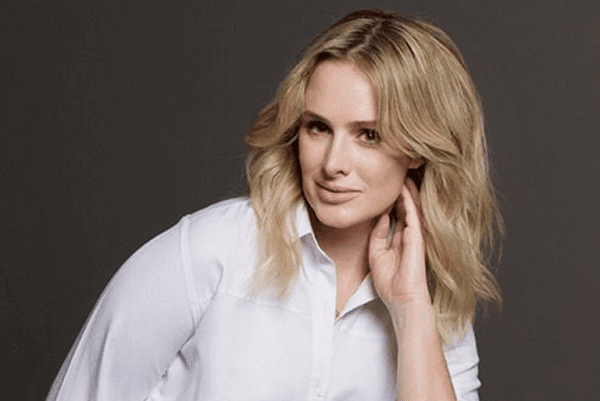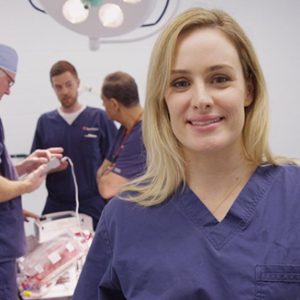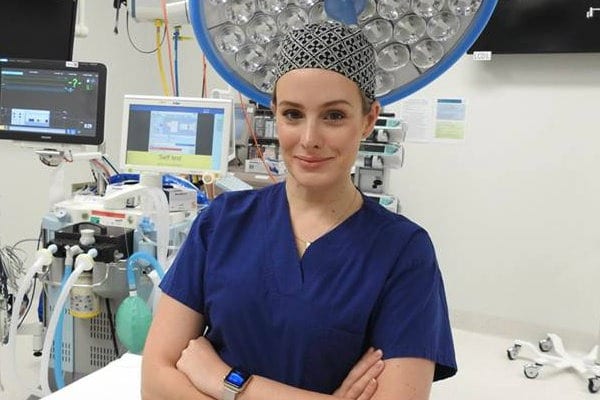As she tells Women’s Agenda, “I’ve never been someone to see something that needs fixing and to just let it go.”
That mindset’s enabled her to become a heart and lung surgeon — at a time when just 12 per cent of surgeons in Australia are female — as well as a regular media contributor, passionate advocate for women in medicine, social campaigner and mentor to women.
It’s also now seeing her speak out on how our obsession with looking healthy could actually be making us sick, and encouraging all of us to take back our health from the instagram influencers, the ‘gurus’, the ‘wellness experts’ and others who don’t actually value our health as much as we do.
Based in Perth, she published her first book Can you die of a Broken Heart?’ last year, which has gone on to be published in seven different languages.
Her new book ‘Pretty Unhealthy’, has just been released, examining just how our relationship with health got so mixed up and how we can take it back.
Dr Stamp’s also been vocal about issues concerning women’s representation in medicine and the media, and she’s a strong advocate for gender equality.
Once again, did we mention her day job as a cardiothoracic surgeon?
Dr Nikki Stamp is speaking at our upcoming Leadership Lunch, celebrating the Women’s Agenda Leadership Awards in Sydney on September the13th. Tickets still available here.
Below she speaks with Jessie Tu in a wide-ranging interview that explores everything from challenging the status quo, to why women are judged more harshly than men, how she manages the huge responsibility of her work and why she’s never let a biased opinion get her down.
You’re an advocate for women and our right to not be judged based on our bodies. Did you foresee yourself being such a public champion when you were training to become a surgeon?
I’ve never been someone to see something that needs fixing and to just let it go. It goes against every fibre of me to ignore problems. The way I see it, being a surgeon, it is my responsibility to use my knowledge and my privilege to advocate and make change. I didn’t necessarily think it would go down some of the twists and turns it did but I’m very glad to have been given these opportunities.
Relatedly, what makes you want to have a public profile?
I definitely did not ever see this coming! My life being a bit more of a public face for things that matter to me like health and women’s issues or gender equality has just continued to snowball. But with each opportunity that comes by, I know that I might be able to make a difference to someone and that’s so important to me. After the first episode of Catalyst aired, I got quite a few letters from little girls who were inspired to be surgeons. That is so cool and if those sorts of things make a difference, well I’m all in.
Being a surgeon involves very intricate fine motor skills. What did you do as a kid that helped this?
I think I’ve always had the ability to stay focussed for long periods and I definitely grew up as one of those kids who tinkered with things, took stuff apart and saw what was on the inside. I don’t know how much of that childhood or some sort of innate ability sticks around; you can be as gifted as you like but it will only get you so far. The rest is hard work and practice.
How can we balance advice that encourages young girls to pursue their passions while simultaneously drawing their attention to the obstacles they will most likely face as a woman in field dominated by men?
I think it’s reasonable to prepare girls and women for the fact that gender bias is a real issue, if only to get them engaged (and those around them) in affecting change and for being the best that they can possibly be.
At the end of the day though, it’s incumbent upon those who have some power to make the change. The barriers are so vast that we should be embarrassed enough to want to make things better.
You said this phenomena doesn’t just exist in medicine; that it’s prevalent across a number of industries and professions?
I think sometimes medicine is maybe not at the forefront but are taking appropriate measures in some cases. For example, the Royal Australasian College of Surgeons has done a good job with diversity and inclusion.
However, I think that medicine has a very long way to go and a lot of that comes down to culture.
There are so many things unique to medical training and medicine as a profession such as hierarchies, lack of alternative options for trainees and a very high stakes professional pathway that means that this culture can percolate for much longer than in say the private sector. Culture change takes time but waiting it out is not an appropriate solution.
How can women combat criticism that they’re too assertive? As you noted previously, women seem to be penalised for the same behaviours exhibited by men.
Being assertive is one of these double binds isn’t it? But we do need to normalise behaviour to female workers that is currently considered undesirable and I think one of the ways of doing that is to expand the numbers of women, especially in leadership positions.
I think again, until we get to a point where this is ‘normal’ we do need to mandate for leaders to be aware of these double binds and be on the lookout for them.

You do fulfilling work. But how do you manage such significant responsibility that comes with what you’re doing day to day, how do you practice self care?
Knowing that you are responsible for someone’s life, for their wellbeing is a big task.
I think although that’s a bit of weight on my shoulders, it’s also a privilege.
And I gladly shoulder that because I want to make someone’s life that little bit better. It does hurt though, especially because a bad day at the office for me can be absolutely terrible.
I know that with my team, we all have each others’ backs and we support one another and that makes an amazing difference. And of course family and friends; debriefing with them is absolutely priceless.
What would you do if you weren’t a surgeon?
Real job would be probably a translator, maybe a lawyer or journalist. Fantasy job would be an actor, which was what I wanted to do when I left school!
Who do you turn to for intellectual and spiritual strength?
It may sound trite but really, my parents are a huge source of strength and inspiration. Over the years, I have made some wonderful female friends from all walks of life, from around the world who are so inspirational and when we band together, it just feels so powerful. I’m lucky to have them.
In your first book, you said women are more likely to die of heart attack than men, and yet, research seems to focus on men. Why do you think this is?
Breast cancer awareness has done the most phenomenal job of raising awareness, increasing research and improving outcomes. There is so much to learn from what they’ve achieved, it is really remarkable. Heart disease is really coming from the back foot. I think that we as doctors and we the community didn’t really know what was going on with gender differences until relatively recently. Although heart disease risks start when you’re young, being affected by it seems like a lifetime away so it’s understandably hard for us to engage.
What is the biggest hurdle you’ve faced (or are still facing) in your career?
That’s a tough question because what’s happening now will probably seem insignificant or at least a blessing in disguise in years to come. At least I hope so! Challenges will always happen and I hope I’m getting better at meeting them and learning from them.
What does a strong leader look like, in your view?
A strong leader is just and fair, strong, advocates for those around her, particularly those more vulnerable than she is and lifts everyone up around her.
Check out other stories Dr Nikki Stamp has recently penned for Women’s Agenda.
Dr Nikki Stamp: These are the small actions we can take every day to push for change
‘We see it & can’t always help’: Why doctors are campaigning against violence towards women
Why women in surgery need other women in surgery




